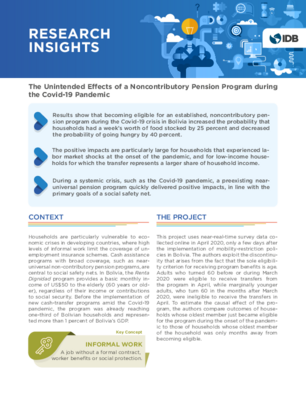Research Insights: The Unintended Effects of a Noncontributory Pension Program during the Covid-19 Pandemic
Date
Nov 2020
Publication
Results show that becoming eligible for an established, noncontributory pension program during the Covid-19 crisis in Bolivia increased the probability that households had a weeks worth of food stocked by 25 percent and decreased the probability of going hungry by 40 percent. The positive impacts are particularly large for households that experienced labor market shocks at the onset of the pandemic, and for low-income households for which the transfer represents a larger share of household income. During a systemic crisis, such as the Covid-19 pandemic, a preexisting nearuniversal pension program quickly delivered positive impacts, in line with the primary goals of a social safety net.




